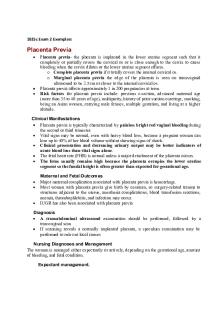Lecture 2 notes PDF

| Title | Lecture 2 notes |
|---|---|
| Course | Psychology Of Crisis Stress Management |
| Institution | Nanyang Technological University |
| Pages | 6 |
| File Size | 200.2 KB |
| File Type | |
| Total Downloads | 36 |
| Total Views | 148 |
Summary
organised and summarised notes...
Description
Hp8006 lecture 2
Stages of disaster
Pre-impact phase! (nothing bad has happened for now)
1. 2. 3. 4.
Impact phase
1. Rescue ! 2. Resource management ! 3. Remedial actions
Post impact phase
1. Recovery from crisis state ! 2. Return to pre-crisis state ! 3. Revive to thriving state
Pre-impact phase
Pre-disaster climate ! Warnings ! Threats ! Uncertainty
Pre-impact phase Warning or threat
Life cycle of disaster!
Impact phase
!
Post impact phase
Period of impact Rescue or heroic
▸ rescue= did something STUPID and it didn’t help! ▸ Heroic = did something stupid and it magically helped with the situation
Remedy of honeymoon
▸ remedy = getting all the resources that they need after they have requested! ▸ honeymoon= rescuers have all the resources that they need! *note:! Usually fridges and coffins are requested at the heroic phase but often only arrives at the honeymoon phase
Inventory phase
▸ taking stock of how much has been damaged
Reconstruction or recovery
▸ how to rebuild the things that are damaged
How do people react in…. • Pre impact phase 1. Personal invulnerability ⟶ thinks that one is not so unlucky and it will not happen to them. Usually have this kind of thinking because it is needed for survival 2. Indifference ⟶ usually people know that earthquake is going to hit but their reaction to it is “ I know but I have no time to deal with it” 3. Fatalism ⟶ either option of doing or not doing something will lead to death , therefore people will usually just do the thing since outcome will be the same 4. Excuse ⟶ always finding excuse 5. Inertia ⟶ one knows that he/she really wants to do something, really want to do but usually the activation energy is too high resulting in not doing it • Warning or threat 1. Denial ⟶ literally in denial 2. Defensive avoidance ⟶ do not want to think about what is going to happen 3. Vigilance ⟶ when people becomes VERY alert at pre-impact phase 4. Tension ⟶ have selfish behaviour, over reaction, behaving like disaster has already happened but it has not • Impact 1. Acute trauma ▸ shock, fear, terror and tension ▸ Heighten arousal, acute stress reactions ▸ Escape, panic and disorganised behaviour * people always assume that people panic at impact phase but may not always be true 2. Heroic altruistic acts ▸actions to save others ▸ risking their own safety ▸ courages actions 3. Illusion of centrality ▸ overemphasis on self ⟶ you must help me (first) ▸ exaggerated impact on self What causes the change from “ I don’t need help, don’t talk to me” to “ I need help, talk to me please “? ⟶ Disaster is an imagined scenario, when disaster happens it is no longer imaginary. It is real and people think that they are the victim now Do people actually panic? ⟶ Not really because humans are active information processors. They are always looking for cues to panic/react
• Rescue or honeymoon phase ▸ organise search and rescue ▸ activities to help victims ▸ help/aid starts pouring in • Inventory phase ▸ disaster stabilises ▸ examine/assess the extent of damage or losses ▸ initial mental health effects when loss is actualised ▸ more people are coming together ( returnees, anxious people, helpers, curious people, exploiters) • Remedy or reconstruction phase ▸ large scale relief efforts ⟶high morale and high tension, usually comes from who is responsible and who will take charge ▸ possible disillusionment if expectation is not met ▸ blame and frame ⟶ sabotage and put blame on someone else ▸ possible second disaster ⟶ how to be sure that disaster will not hit again ? It would be devastating on morale if disaster were to happen when things have just turned better • Post impact phase ▸ recovery ( funeral service & rituals, memorial service & ceremonies ) ▸ return to normalcy ▸ reconstruction and rebuilding ▸ risk of forgetting • Reconstruction phase ▸ physical and psychological rebuilding ▸ active involvement is important for recovery ▸ mental health problems starts to be evident ⟶ report traumatic re-experiencing ▸ emotional help is needed for the ones who are affected Psychological reactions in disasters 1. Direct and indirect crisis effect A disaster is a huge event Loss and trauma will affect people directly ( people who were involved in the disaster ) and indirectly ( people who know of the disaster through news, social media …) Everyone who either directly meets with disaster or witnesses a disaster scene is likely to experience crisis or traumatic stress Those indirectly impacted by being part of the affected community, or experience a disaster “second hand “ through an extensive media coverage can also be affected 2. Nature of impact Human reactions in crisis requires a multidimensional perspective because how survivor reacts will be affected by: • Nature of disaster (natural vs manmade )
• Predictable or unexpected The greater and more intense an individual’s exposure (in space, time, experience ) is to a disaster, the more likely it is that he or she will suffer from more significant reaction 3. Crisis stress Though disasters are stressful but it does not equate to trauma or can lead to PTSD Exposure to stress also produce a distinct physical response Psychological trauma disrupts homeostasis and can cause both short term and long term effects on many areas of functioning Somatic symptoms Fatigue, Sleep disturbances, Loss of appetite, Indigestion, Constipation, Sweating, Diarrhoea, Giddiness, Breathlessness, Hyperventilation, Nausea, Vomiting, Bodily aches and pains, Palpitation Emotional symptoms Negative feelings and emotion, anxiety, fear, irritability, anger, guilt, sadness, depression Cognitive symptoms Mental confusion, worry, poor attention and concentration, memory difficulty, mental slowness, illusions ( see things that people don’t see and usually happens when its extremely stressful ) * Delusion : hover over certain ideas that are not present in reality ? Behavioural symptoms Social withdrawal, alienation, increased conflicts in relationships, aggressive behaviour, substance abuse, poor work and school performance Type of characteristics in crisis state Confusing Lack of information Feeling of isolation and loneliness Seemingly no alternatives Type of person in crisis Susceptible to suggestions Recoils to his internal world ( withdraws and becomes more private) Not processing information in the usual way Disoriented ( may not be orientation to place, time and person) Isolated ( isolate himself/herself or interactions ) Nature of trauma Trauma is wounded in greek word Physical trauma refers to injury or bodily damaged caused bu violence or accident Psychological trauma refers to an emotional wound or shock or lasting effect Concept of trauma;
• • •
An external experience causing deeply internal, harmful psychological change Individual trauma ( everyone can go through trauma but it differs how it can affect each person) Collective trauma ( suffer together, doesn’t hav to be physical trauma, can feel that they are targeted)
* psychological trauma is harder to identify* Nature of disaster Disrupts nearly all activities of daily living and human relationships Disrupts work, business, transportations etc Causes separation and relocation of people to shelters and relief centres away from their neighbours, friends social groups and familiar surroundings Increase family conflicts and undermine family relationships * psychological injury, can emergency personnel be affected ?* ⟶ it depends on the relationship of family/friend ⟶ emergency personnel go through trainings that tell them what to do and expect in emergency scenario but it does not replicate reality entirely ⟶ training allows them to expect the unexpected ⟶ they can be affected not because they have no cognitive map but because “ the more he identifies with the situation, the more vulnerable he becomes “ ⟶ Psychological injury happens when something exceeds the limit Psychological injury and trauma Regardless any person directly or indirectly impacted by the disaster or critical incident could be affected Psychological injury can afflict anyone Greater personal identification with aspects of event = higher level of vulnerability Trauma when victims and worker • Overwhelmed or helpless • Or angry at what happened • Or frustrated that not enough was done Victims and workers may not suffer prolonged debilitating symptoms of post traumatic stress What is traumatic stress? Even after the event is over, it is uncommon for emergency personnel to suffer from disturbed sleep, nightmares, loss of appetite, moodiness, irritability and anxiety. Some may have flashbacks* and intrusive memories of the event. All these are symptoms of traumatic stress or critical stress incident. *flashback is not equals to recall! Flashback happens when there is an intrusive recollection and is transported back to the scene of trauma. Flashback is not beyond someone’s control
Does traumatic stress affect victims ?
Victims can experience palpitation, nausea, profuse sweating or chills and tremors They may become confused and have difficulty making decisions, following orders or remembering procedures Some may feel sad, angry for what has happened or fearful that event will happen will happen again Some may have emotional outburst, other may have numbness and a sense of isolation Traumatic stress Symptoms are often temporary in nature Known to affect up to 80% or more of all emergency personnels at some point in their careers; no one is immune Survivor’s Traumatic stress reactions Death imprints Feelings like “ I should have died ….”, “ things wouldn’t be like how it is now ….” Affect their ability to carry on with life as him/herself Survivor guilt Usually someone will suffer from survivor guilt when they are the one who was supposed to die but someone died in their place Psychic numbing Survivors feel so overwhelmed that they do not know how to react anymore ?? Nurturance conflict “ You know I love you but if I die you will be hurt, so I don’t love you now …” Usually happens to parents Quest for meaning Make my second chance of living counts...
Similar Free PDFs

Lecture notes, lecture 2
- 3 Pages
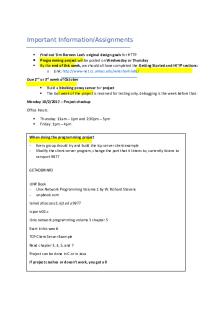
2 - Lecture notes 2
- 5 Pages

Lecture notes, lecture Chapter 2
- 11 Pages
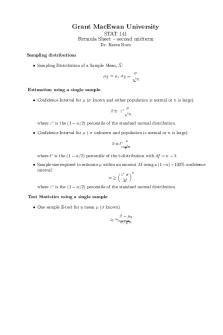
Lecture notes, lecture formula 2
- 1 Pages

2 Biodiversity - Lecture notes 2
- 33 Pages
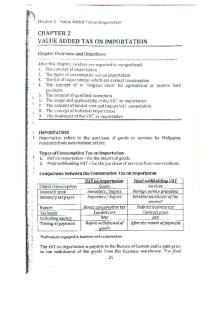
Chapter 2 - Lecture notes 2
- 30 Pages
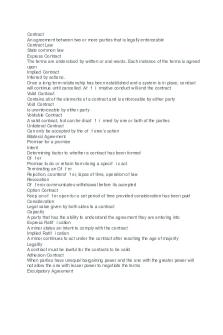
Blaw 2 - Lecture notes 2
- 4 Pages
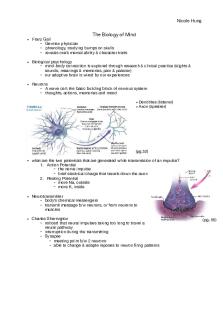
Chapter 2 - Lecture notes 2
- 4 Pages
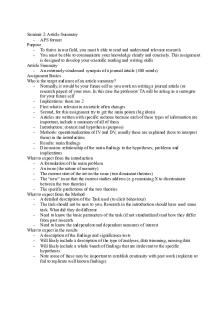
Seminar 2 - Lecture notes 2
- 2 Pages
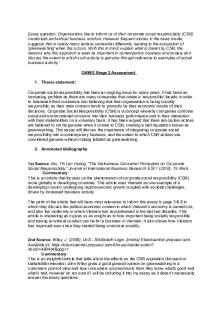
Stage 2 - Lecture notes 2
- 3 Pages
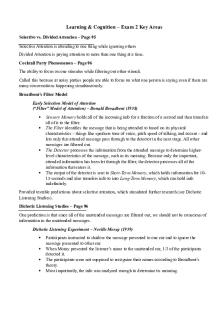
Exam 2 - Lecture notes 2
- 5 Pages

Lectia 2 - Lecture notes 2
- 3 Pages
Popular Institutions
- Tinajero National High School - Annex
- Politeknik Caltex Riau
- Yokohama City University
- SGT University
- University of Al-Qadisiyah
- Divine Word College of Vigan
- Techniek College Rotterdam
- Universidade de Santiago
- Universiti Teknologi MARA Cawangan Johor Kampus Pasir Gudang
- Poltekkes Kemenkes Yogyakarta
- Baguio City National High School
- Colegio san marcos
- preparatoria uno
- Centro de Bachillerato Tecnológico Industrial y de Servicios No. 107
- Dalian Maritime University
- Quang Trung Secondary School
- Colegio Tecnológico en Informática
- Corporación Regional de Educación Superior
- Grupo CEDVA
- Dar Al Uloom University
- Centro de Estudios Preuniversitarios de la Universidad Nacional de Ingeniería
- 上智大学
- Aakash International School, Nuna Majara
- San Felipe Neri Catholic School
- Kang Chiao International School - New Taipei City
- Misamis Occidental National High School
- Institución Educativa Escuela Normal Juan Ladrilleros
- Kolehiyo ng Pantukan
- Batanes State College
- Instituto Continental
- Sekolah Menengah Kejuruan Kesehatan Kaltara (Tarakan)
- Colegio de La Inmaculada Concepcion - Cebu

